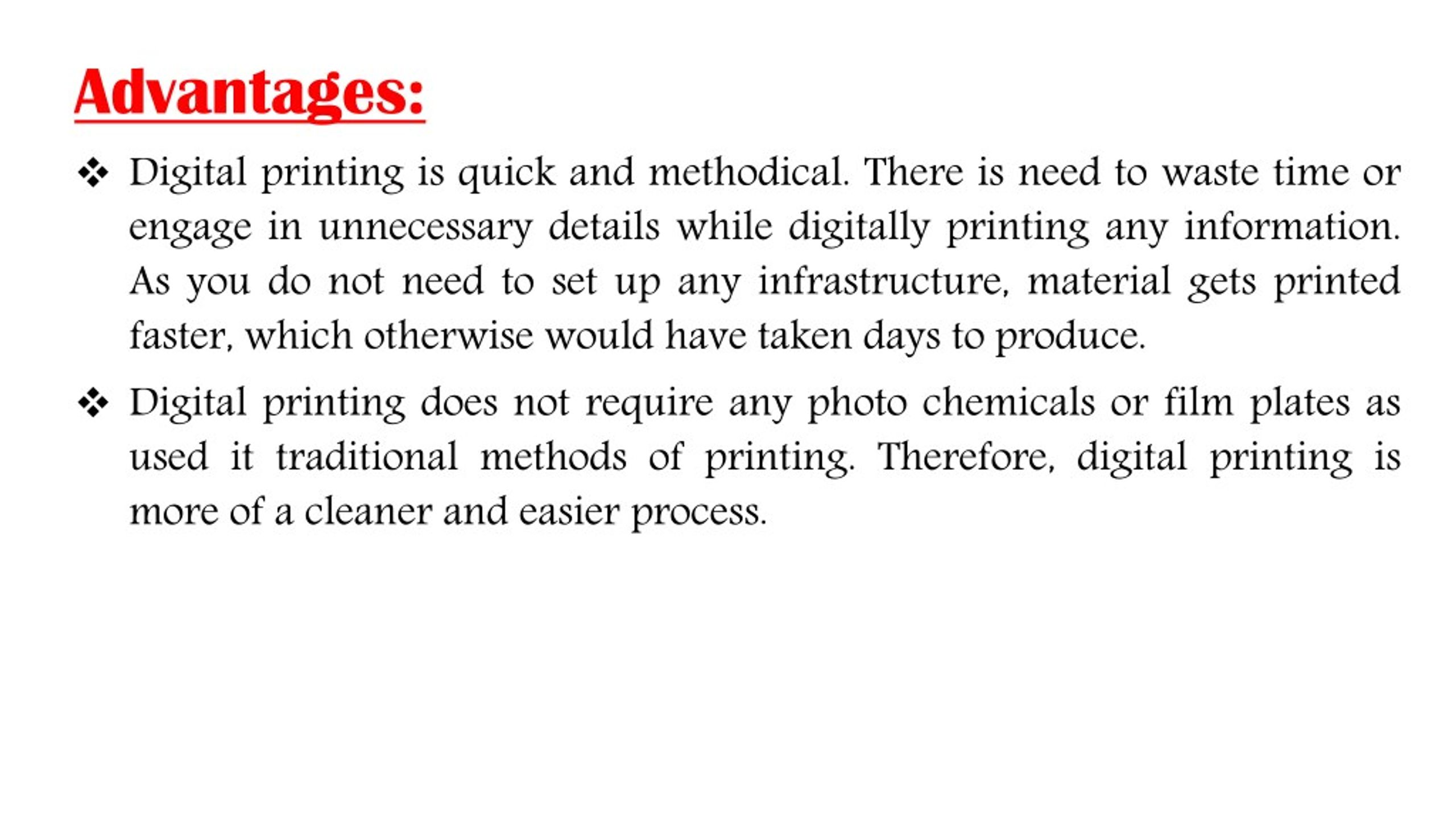Digital Printing Fundamentals Explained
Digital Printing Fundamentals Explained
Blog Article
3 Easy Facts About Digital Printing Shown
Table of Contents5 Easy Facts About Digital Printing Explained7 Easy Facts About Digital Printing Shown3 Simple Techniques For Digital PrintingThe Buzz on Digital PrintingSome Of Digital PrintingThe Main Principles Of Digital Printing
Variable information printing, such as straight mail with customized codes and addresses, is preferably suited for electronic printing. Digital fast printing only needs 4 steps of design, evaluation, printing and binding to obtain everything done. Digital fast printing has an unmatched advantage: print on need.According to PMMI, electronic printing allows brands and makers to react quickly to consumer demands while boosting the supply chain, reducing warehousing price and waste, and taking pleasure in faster time to market. That all audios fantastic, however exactly how does this innovation do all that? The significant differentiator of these innovations is that there are no set-up fees and no plates with digital printing.
Not known Facts About Digital Printing
This results in quicker turnaround time and decreases cost when making use of digital printing.
Speedy production indicates getting your product to market faster. It also suggests it's simpler and faster to make changes later, when you change a recipe, include a SKU, or create seasonal product packaging. Digital printing is very versatile, so it's simple to make modifications to the plan design swiftly. All of it returns to home plates.
More supply can indicate even more waste later on. With standard printing methods, short-run printing is just not possible. Because an excellent design can make or break your product, digital printing continually produces high-quality, clear and vivid graphics each time. Digital printing on flexible bags includes the bright, dynamic, and exact graphics that almost beckon consumers to get to out and touch them.
Digital printing is the procedure of printing digital-based photos straight onto a selection of media substratums. There is no demand for a printing plate, unlike with balanced out printing. Digital files such as PDFs or desktop computer posting data can be sent straight to the electronic printing press to publish theoretically, photo paper, canvas, textile, synthetics, cardstock and other substratums.
Examine This Report about Digital Printing
According to PMMI, digital printing enables brands and suppliers to respond quickly to customer demands while improving the supply chain, lowering warehousing cost and waste, and delighting in faster time to market. That all sounds great, yet exactly how does this innovation do all that? The significant differentiator of these innovations is that there are no set-up costs and no plates with electronic printing.
According to Wikipedia, the best difference between digital printing and traditional techniques such as lithography, flexography, gravure, or letterpress is that there is no demand to replace printing plates in digital printing, whereas in these analog printing approaches home plates are consistently replaced. This results in quicker turnaround time and decreases price when using digital printing.

The Definitive Guide for Digital Printing
With traditional printing techniques, short-run printing is simply not feasible. Since a wonderful layout can make or damage your item, electronic printing constantly develops top notch, clear and vivid graphics each time.

According to PMMI, digital printing enables brand names and suppliers to respond swiftly to consumer demands while improving the supply chain, lowering warehousing price and waste, and enjoying faster time to market. That all sounds excellent, link however how does this innovation do all that? The significant differentiator of these innovations is that there are no set up costs and no plates with electronic printing.
7 Easy Facts About Digital Printing Shown
According to Wikipedia, the best difference between digital printing and conventional techniques such as lithography, flexography, gravure, or letterpress is that there is no need to change printing plates in electronic printing, whereas in these analog printing techniques home plates are consistently changed. This leads to quicker turn-around time and decreases cost when making use of electronic printing.
Digital printing is very versatile, so it's simple to make adjustments to the bundle layout promptly. It all goes back to the plates.

Unknown Facts About Digital Printing
Digital printing is the process of printing digital-based photos directly onto a range of media substratums. There visit here is no requirement for a printing plate, unlike with balanced out printing. Digital data such as PDFs or desktop computer publishing files can be sent out directly to the digital printing press to print on paper, image paper, canvas, fabric, synthetics, cardstock and various other substrates.
Report this page